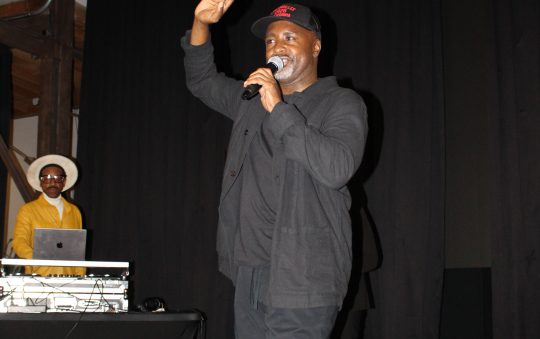
Hill, assistant principal and creative writing teacher at Holly Ridge Elementary School in Richland Parish, said he is launching the Ernest Hill Great Read on the holiday as part of his role as the 2022 Louisiana Middle School Teacher of the Year. For the pilot of the program, various schools across the state will get a copy of his book, “A Life for a Life” to encourage reading while also exposing children to more stories where they can see themselves.
While literacy is an issue statewide in Louisiana, Hill said the illiteracy is especially prominent among Black middle school students, as about 90% of Black middle schoolers are not proficient when it comes to reading. Through this program, Hill hopes to change that.
“It’s sort of a continuation of everything that King talked about,” Hill said. “I believe in movements; I believe in doing things in a large way in order to create a winning culture or mindset among the masses so that we move in one step towards an ultimate goal of success and that’s education.”
In addition to the launch of the project, Hill has his annual lesson about King planned for his students at Holly Ridge. He will show his students a video about King followed by a period of self-reflection to think about how to apply his actions to their lives today.

He also emphasizes to his students that the holiday is best celebrated with action.
“I often tell them that if we live our lives the correct way and if we put ourselves in a position to to be successful, that at some point we have to become the answer to people’s prayers,” Hill said. “I just try to make sure that they understand the overall message of King and then how we can apply it to our lives in terms of the opportunity that we have in this country to be whatever we want to be _ and the obligation we have to give our best effort to make sure that sacrifices of people like King were not in vain.”
Xiomara Bell, world history teacher at Madison High School in Madison Parish, has already conducted her lesson about King with her students. She focused it on the nuances surrounding his work, helping move away from a single point of view about the civil rights movement.
“When you’re thinking about the history curriculum in the state of Louisiana, particularly because that’s where I’m teaching, it’s oftentimes from a very Euro-centric lens,” Bell said. “It is incumbent upon me to have these conversations with my students so they can see a reflection of themselves in history.”
For example, the fight for desegregation ultimately minimized the power of the Black community, Bell said. As members of the Black community gained the power to spend their dollars in other communities, Black-owned businesses had less financial support.
This later contributed to there being fewer Black business owners, Bell said. Furthermore, as Black community members moved out of segregated neighborhoods, the safe spaces that were built over time waned.
“You don’t necessarily have a grounded space to be, to feel comfortable and relax,” Bell said. “You’ve got to think about the atrocities that Black people had to endure once they desegregated these places because they were harassed; they were dehumanized. They no longer had a solid, grounded voice, which was their way to counteract the power the systems that were put in place to continue to oppress people.”
Bell said this information didn’t necessarily shock her students, seeing as how 80% of Tallulah is Black, meaning that many history teachers are also Black. She said that even with it being her first year teaching, there is an understanding among the Black history teachers in Madison Parish to tell their own stories because the history books won’t.
However, Bell said education about the history of civil rights and the enslavement of Black people cannot stop at the classroom door. Rather, she said there is an entire history to be acknowledged even about Madison Parish and the 12,000 enslaved people who lived there in 1860.
This history contributed to Black people not owning their own land, not owning businesses where they are in the majority, she said.
“That’s a problem that history has affected owners, and we don’t even talk about it in this area,” Bell said. “People are hushed thinking, ‘OK, I want to join these races. We need to desegregate these places,’ yet, we don’t acknowledge how we even got here. That’s what Dr. King would like people to know.”
In the same parish, LaKiesha Frazier, sixth grade science and social studies teacher for Madison Middle School, wants her students to show off their creative side while learning about King.
After a discussion about the civil rights movement, Frazier plans for her students to trace their feet as part of a display inspired by a quote from King: “If you can’t fly then run, if you can’t run then walk, if you can’t walk then crawl, but whatever you do you have to keep moving forward.”
Students will take the outlines of their feet and write in each of them. On one foot, students will write down something that shows how King helped them to keep moving forward. In the other, students will elaborate on the importance of continuing to move forward themselves.
Once done, all the drawings will be displayed down the halls.
“I think this will impact them more because we have had things going on, movements, and the kids see it now,” Frazier said. “In past years, they weren’t able to really truly see it, but with everything is going on, with all the movements that they had, they understand more why they have to keep moving on, why they have to keep doing this and why it’s so important.”







